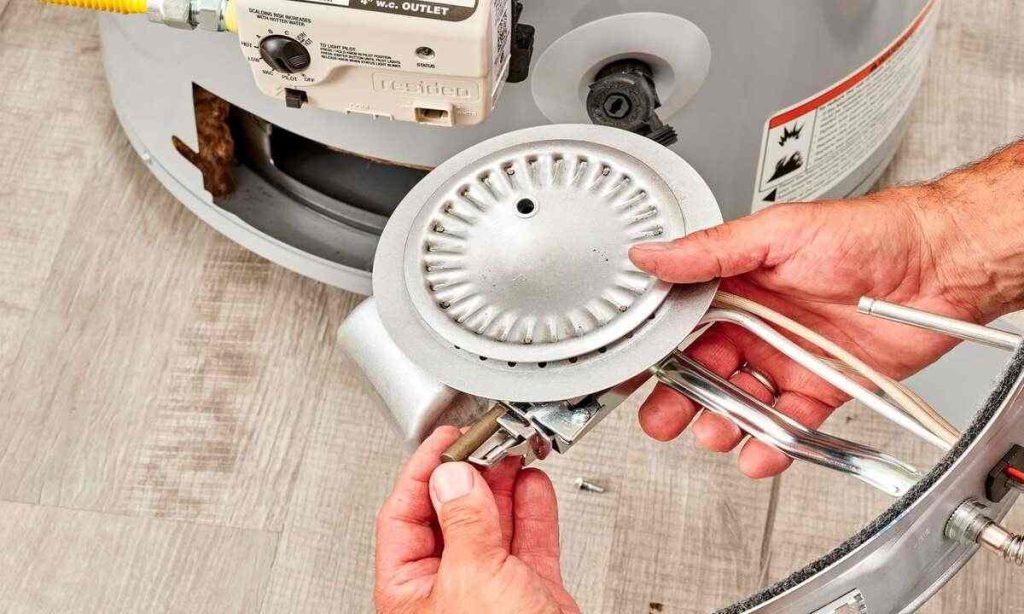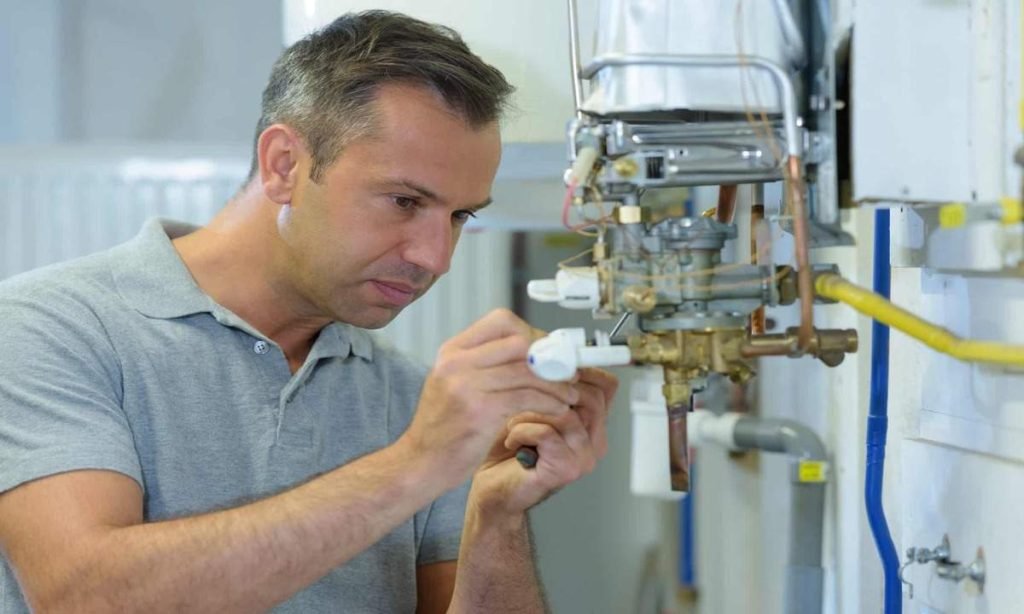Discovering issues with your gas water heater? If you’ve noticed inconsistent hot water or the pilot light frequently going out, it could be a failing thermocouple. Wondering what to do? Well, don’t fret! The Pro Plumbing is here to guide you through the signs of a failing thermocouple. This tiny component plays a crucial role in ensuring your water heater operates smoothly. Stay tuned for valuable insights and practical tips to troubleshoot and address thermocouple problems, brought to you by The Pro Plumbing experts. Your reliable source for all things plumbing-related!
Chapter 1: What the Heck is a Thermocouple?
Before we jump into the signs of a failing thermocouple, let’s get acquainted with this unsung hero of your gas water heater. A thermocouple is a small sensor that plays a big role in ensuring your water heater operates safely and efficiently.
Simply put, it’s a heat-sensitive device positioned near the pilot light. Its main job? To detect whether the pilot light is burning. If the pilot light goes out, the thermocouple sends a signal to the gas valve to shut off the gas supply, preventing any potentially dangerous gas leaks.
Chapter 2: Signs of Trouble
Now that you’ve made friends with your thermocouple let’s talk about the signs that it might be on the fritz. Remember, an early diagnosis can save you from cold showers and potential water heater disasters.
2.1. Inconsistent Hot Water:
One of the most common signs is a sudden inconsistency in your hot water supply. If you find yourself playing a game of water temperature roulette, it’s time to consider the thermocouple.
2.2. Pilot Light Woes:
Keep an eye on that little flame. If the pilot light frequently goes out, it might signal a thermocouple issue. A healthy thermocouple keeps the pilot light burning steadily.
2.3. Difficulties in Ignition:
Trouble starting the pilot light or getting your water heater to fire up? The thermocouple could be the culprit, preventing the gas valve from opening.
2.4. Unexpected Shutdowns:
Does your water heater unexpectedly shut down, leaving you in the cold? A failing thermocouple might be triggering the gas valve to close, causing the shutdown.
2.5. Strange Noises:
Unusual sounds like popping or banging from your water heater could indicate various issues, including problems with the thermocouple. It’s like your water heater trying to play you a strange tune – not the kind of music you want to hear.
Chapter 3: DIY Troubleshooting
Now that you’re well-versed in the signs, let’s roll up our sleeves and get hands-on with some troubleshooting. Remember, safety first! If you’re not comfortable or unsure about any steps, it’s always best to call in The Pro Plumbing experts.
3.1. Check the Pilot Light:
Start by inspecting the pilot light. Is it burning steadily? If not, try relighting it according to your water heater’s instructions. If it continues to go out, the thermocouple might need attention.
3.2. Clean the Thermocouple:
When troubleshooting, ensure to clean the thermocouple from dust and debris using compressed air or a soft brush. It’s essential to understand water heater venting requirements for homes in Alhambra to maintain proper ventilation. The Pro Plumbing can assist in assessing and meeting these requirements, ensuring your water heater functions safely and efficiently. Trust their expertise for comprehensive solutions tailored to your specific location and needs.
3.3. Inspect for Bending or Damage:

During your DIY inspection, carefully examine the thermocouple for any bending, warping, or visible damage. If you notice any cracks or breaks, or if there is discoloration near the connection points, it’s a sign of potential issues. Addressing a damaged thermocouple promptly is crucial for water heater repair, ensuring the proper functioning of the system. If unsure, consult with professionals, such as The Pro Plumbing, for expert assistance.
3.4. Check the Gas Valve:
Ensure that the gas valve is in good condition. If it’s faulty, it can impact the thermocouple’s function. If you suspect an issue, it’s time to call in The Pro Plumbing for a professional assessment.
Chapter 4: When to Call in The Pro Plumbing
While DIY troubleshooting can resolve some issues, there are situations where the expertise of The Pro Plumbing professionals is invaluable.
4.1. Age of the Water Heater:
If your water heater is reaching the end of its lifespan, it might be more prone to component failures, including the thermocouple. The Pro Plumbing can assess the overall health of your system and recommend necessary repairs or replacements.
4.2. Persistent Issues:
If you’ve tried troubleshooting without success and the problems persist, it’s time to bring in the experts. The Pro Plumbing team can conduct a thorough inspection, pinpoint the root cause, and implement the necessary fixes.
4.3. Gas Smells or Leaks:
If you ever detect the smell of gas or suspect a leak, it’s crucial to prioritize safety. Immediately evacuate the area and contact your gas company. Once it’s safe, seek professional help from The Pro Plumbing for a thorough inspection and gas leak detection services. Their experts can swiftly identify and address any leaks, ensuring the safety of your home and preventing potential hazards.
Chapter 5: Maintenance Tips to Keep Your Thermocouple Happy

Prevention is key, right? Here are some maintenance tips to keep your thermocouple – and your entire water heater – in top-notch condition:
5.1. Regular Cleaning:
Schedule periodic cleanings to remove dust and debris from around the thermocouple. A clean environment ensures optimal performance.
5.2. Annual Inspections:
Consider an annual inspection by The Pro Plumbing to catch potential issues before they escalate. It’s a small investment that can save you from major headaches down the line.
Chapter 6: Upgrading Your Water Heater for Long-Term Reliability
While troubleshooting and maintenance can keep your current water heater running smoothly, there comes a time when an upgrade might be the best solution. The Pro Plumbing experts can guide you through the process of selecting a new, energy-efficient water heater that meets your household’s hot water demands.
6.1. Tankless Water Heaters:
Consider upgrading to tankless water heaters for on-demand hot water and energy efficiency. The Pro Plumbing offers expert tankless water services, guiding you through the selection and installation process. Experience the convenience of endless hot water while reducing energy consumption. Trust The Pro Plumbing to seamlessly integrate these advanced systems into your home, providing efficient and reliable hot water for your daily needs.
6.2. Energy-Efficient Models:
Newer water heater models boast improved energy efficiency, reducing your utility bills and environmental impact. Pro Plumbing can help you choose a high-efficiency model that aligns with your budget and sustainability goals.
6.3. Smart Water Heaters:
Explore smart water heater options that allow you to control and monitor your system remotely. The Pro Plumbing can install and integrate these advanced systems, providing you with enhanced convenience and control.
FAQs
How do I know if my water heater thermocouple is bad?
If your water heater’s pilot light frequently goes out, or you experience inconsistent hot water, it could indicate a bad thermocouple. Additionally, difficulty in igniting the pilot light or unexpected shutdowns are signs of a potential thermocouple issue. If you notice these issues, it’s advisable to inspect and possibly replace the thermocouple or seek professional assistance from a plumbing expert.
What happens when a thermocouple goes out on a hot water heater?
When a thermocouple goes out on a hot water heater, the pilot light will likely extinguish, cutting off the gas supply to prevent potential gas leaks. As a result, the water heater won’t be able to ignite and heat the water, leading to a loss of hot water in your household. Replacing the faulty thermocouple or seeking professional assistance is necessary to restore proper functionality.
How is it possible to determine if a thermocouple is weak?
To determine if a thermocouple is weak, observe the pilot light’s behavior. If the flame is weak, flickering, or struggles to stay lit, it may indicate a weakening thermocouple. Additionally, if the pilot light goes out shortly after ignition or exhibits inconsistency, it suggests the thermocouple might be losing its ability to generate sufficient voltage. Lastly, using a multimeter to measure the voltage output of the thermocouple can provide a quantitative assessment of its strength.
What happens when a thermocouple fails?
When a thermocouple fails, it loses its ability to generate sufficient voltage to keep the gas valve open. As a result, the gas supply to the water heater is shut off, causing the pilot light to go out. This leads to a complete loss of heating function, and the water heater won’t produce hot water until the faulty thermocouple is replaced.
What does a damaged thermocouple look like?
A damaged thermocouple may exhibit visible signs such as bending, warping, or corrosion on its surface. Additionally, if there are any cracks or breaks in the thermocouple, it is likely compromised. Any discoloration, particularly near the connection points, may also indicate a problem, suggesting that the thermocouple may need replacement for the proper functioning of the water heater.
Conclusion
With this in-depth guide presented by The Pro Plumbing, you’re equipped to navigate the world of thermocouples in gas water heaters. From recognizing signs of trouble to DIY troubleshooting and seeking professional assistance, you now have the knowledge to maintain a reliable and efficient hot water supply in your home.
Remember, The Pro Plumbing is your trusted partner in plumbing solutions. Whether it’s routine maintenance, repairs, or a water heater upgrade, their experienced team is ready to ensure your comfort and peace of mind. Here’s to a well-functioning water heater and the expertise of The Pro Plumbing!

